Tuesdays are packing days at Lomita Farm east of Portland in Gresham. Gonzalo Garcia Reyes has picked most of the peppers, bok choy, turnips and green beans the day before and is halfway done packing them into CSA – community supported agriculture – boxes labeled “Produce from the Northwest.”

Gonzalo Garcia Reyes standing next to plot of leafy greens at the Headwaters Farm Incubator in Gresham, Ore., Oct. 8, 2024. Garcia Reyes' farm is called Lomita Farm, which translates to little hill in Spanish.
Alejandro Figueroa / OPB
Reyes says they’re headed to a nonprofit he partners with that pays him market price for the produce. That nonprofit then gives the boxes to mostly low-income families in Clackamas and Multnomah counties.
“I try to grow a lot of indigenous foods like calabacitas, beans, tomatoes, tomatillos,” he says “And I partner with different nonprofits to be able to get that food out there to my community.”
Reyes does not come from a traditional farming background. He went to college and majored in Spanish and Latin American studies. The plan was to go to law school and maybe become an immigration attorney.
“And I did a lot of internships and realized that that type of work was not something I actually wanted to pursue, and I wanted to be outdoors and get my hands dirty,” he says.
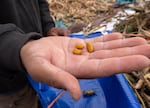
Gonzalo Garcia Reyes holds some beans he's drying inside a greenhouse at the Headwaters farm in Gresham, Ore. Oct. 8, 2024.
Alejandro Figueroa / OPB
Reyes, who was born in Oaxaca, Mexico, says his family does have some land and farms back home, but they just grow food for themselves. When he was just a 5-year-old, his parents moved to California and then Oregon in search of work. At times when he was a teenager, he picked blueberries with his family. He saw how undervalued farm labor can be, and he says being a farmer now gives him the ability to change that narrative for himself.
“The way I frame it is that I like to reclaim my labor and like to find ways to do this work and continue to do this work and also to pay myself for what I’m doing,” he says.
He’s been farming now for four seasons. But this industry is challenging to break into.
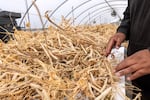
A stack of beans Gonzalo Garcia Reyes is drying inside a greenhouse at the Headwaters farm in Gresham, Ore., Oct. 8, 2024.
Alejandro Figueroa / OPB
“It’s really hard to get into agriculture if you do not come from a farming background, if you don’t have land that you’re inheriting or able to work on with your family,” says Rowan Steele, the program manager at the Headwaters Farm incubator in Gresham.
That’s where Reyes rents some plots at an affordable rate and is able to farm. Headwaters is a tax-funded program managed by the East Multnomah Soil and Water Conservation District. It serves as a launch pad for the next generation of farmers.
“The way that we do that is, we provide skilled, knowledgeable, experienced farmers who lack the funds to get a farm business off the ground with five years of access to farmland out here and farm equipment and farm infrastructure with other supports,” Steele says.

A row of flowers at the Headwaters Farm Incubator in Gresham, Ore., Oct. 8, 2024. Headwaters is a tax-funded program managed by the East Multnomah Soil and Water Conservation District.
Alejandro Figueroa / OPB
Through the program, farmers can lease an acre of land for as much as $750 per year — that rate might change the longer the farmer is in the program. They also have access to farming equipment and irrigation.
At its core, the program is preparing the next generation of farmers to feed their communities while also creating robust, sustainable farms, Steele says.
No clear pathway to farming for beginning farmers
Over a third of all farms in the U.S. are expected to change hands by 2035. Many farmers are aging out of the industry. In Oregon, the average age of a farmer is nearly 60.
On the flip side, the number of young or beginning farmers — which the U.S. Department of Agriculture (USDA) defines as people who’ve farmed for less than 10 years — is growing, at least in Oregon, where the number of beginning farmers grew by more than 2,000 between 2017 and 2022, to about 22,900, according to the latest census of agriculture published by the USDA.
However, access to land is often a major barrier. In parts of the Willamette Valley, farmland prices can average over $20,000 per acre.
Finding affordable land isn’t easy
Christina Bentrup, a farmer herself and the Willamette Valley farmland navigator at Oregon Farm Link, compares trying to find land to the housing market.
“If you just think about the housing crisis that exists nationally and in our state and how challenging it is to purchase a starter home, farmers face that exact challenge except on a really escalated scale,” she says. “Land prices, farmland prices have escalated far more.”
Oregon Farm Link, a program under Oregon nonprofit Friends of Family Farmers, helps connect beginning farmers with landowners. It also offers up support for farmers and other more specific resources for indigenous farmers and farmers of color.
Bentrup says she does not believe there is a shortage of young or beginning farmers wanting to enter into the industry, but a lot of people, she says, do feel like it’s out of reach.
“I think there are such high barriers that people have walked away from farming,” she says. “There’s a desire to farm, but there’s not a pathway.”
In the last few years, though, she’s seen a growing interest from federal agencies like the USDA and private sector financing groups open up loan programs for small farmers.

A row of radishes and leafy greens Gonzalo Garcia Reyes grew in his plot at the Headwaters farm in Gresham, Ore., Oct. 8, 2024.
Alejandro Figueroa / OPB
But accessing some of those loans is challenging, mostly because the paperwork and applications are written for large commodity farmers, not producers that grow diverse crops on small amounts of land, Bentrup says.
“It is so hard to make money farming, and you have to make money to pay back those loans,” she says. “There is incredible scrutiny on those loans and so they’re very hard to get.”
“On top of that, farming is not just the physical process of growing things,” says Steele from Headwaters, the incubator program. “It’s also running a business.”
Emily Cooper at Full Cellar Farm knows just how hard that can be. On an early fall afternoon, she stands inside one of the plastic-covered hoop houses at her farm — they’re empty.
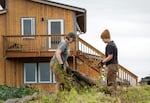
Emily Cooper, left, from Full Cellar Farm, pulling out a plastic weed barrier to get a plot ready for the winter season, Oct. 8, 2024.
Alejandro Figueroa / OPB
“It kind of looks like a ghost town because we’ve cleared out all of our tomatoes and cucumbers that we grew this summer,” she says. “And we’re going to be prepping new beds and planting them here in the next week or two.”
She graduated from the incubator program in 2019 and was able to purchase 14 acres of land right next to the Headwaters farm in Gresham. Like Reyes, she did not come from a farming family. She grew up on the East Coast in Massachusetts and studied journalism in college.
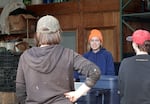
Emily Cooper, left, and her crew at a warehouse at Full Cellar Farm in Gresham, Ore., Oct 8, 2024.
Alejandro Figueroa / OPB
Although she was able to purchase land after the program, she says, there are a lot of hats she has to wear to make her business work.
“I had to learn a lot more about HR and payroll and also just maintaining the property, like the parts of it that aren’t in crops,” she says.
But the path to get there is not so clear.
“I think that farm work is very inspiring and rewarding and creative and being part of growing plants in a natural setting is something that I think a lot more people could be on board with,” she says.
But Cooper says, that’s only if barriers within the industry change, like better pay and benefits or access to resources.
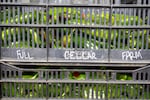
A crate of peppers harvested at Full Cellar Farm in Gresham, Ore., Oct. 8, 2024.
Alejandro Figueroa / OPB
Bentrup, the farmland navigator, says if that doesn’t change, Oregon, along with the rest of the nation, risks becoming more dependent on bigger, corporate-owned farms and supply chains, which isn’t ideal, she says.
“Consolidation has led, in some ways, to cheaper food prices in grocery stores and in other ways, it has left communities far more vulnerable to disruptions in food supply chains,” she says. “[Those] supply chains have incredible costs and many points of weaknesses, including their own labor issues and their own natural resource issues.”
Headwaters might not solve all of those problems, but for Gonzalo Garcia Reyes, it’s a start.
“I don’t need to feed everyone or save the world. I think I can just start with the people, my neighbors and my family members like people down the street,” he says.
That all starts with having a shot at stewarding the land.
